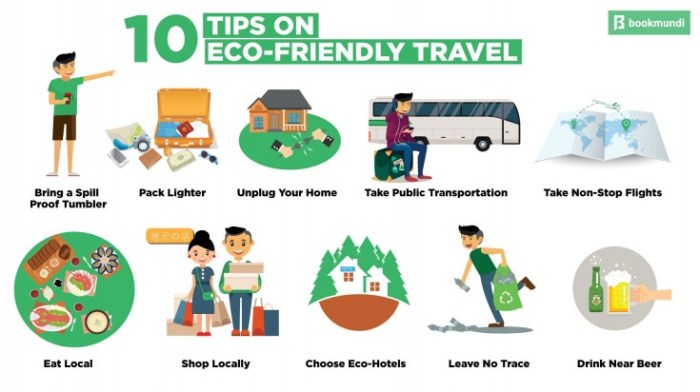Embark on a transformative journey with our eco-friendly travel tips, meticulously curated to guide you towards a sustainable and fulfilling travel experience. As responsible travelers, we have a collective responsibility to minimize our environmental impact while exploring the wonders of our planet.
By embracing eco-conscious practices, we not only protect the delicate ecosystems we visit but also enrich our own experiences by connecting with local communities, supporting ethical businesses, and gaining a deeper appreciation for the beauty of our surroundings.
Transportation Options
When traveling, opting for eco-friendly transportation can significantly reduce your carbon footprint. Here are some sustainable options to consider:
Train
Train travel is often a more environmentally friendly choice than flying or driving. Electric trains, in particular, produce zero emissions during operation.
- Example: The high-speed rail line between Paris and London emits 90% less carbon dioxide than flying the same route.
Bus
Buses are another relatively eco-friendly transportation option, especially for shorter distances. Look for buses that use alternative fuels, such as biodiesel or electric power.
- Example: The FlixBus network in Europe operates a fleet of buses that run on 100% renewable energy.
Electric Vehicles, Eco-friendly travel tips
Electric vehicles (EVs) produce zero tailpipe emissions, making them a sustainable choice for road travel. When charging EVs, opt for renewable energy sources whenever possible.
To embrace a more sustainable approach to travel, consider adopting eco-friendly travel tips. These practical recommendations can help you minimize your environmental impact while exploring the world. From choosing eco-friendly transportation to supporting local businesses, eco-friendly travel tips can guide you towards a more responsible and rewarding travel experience.
- Example: The Tesla Model 3 has a range of over 350 miles on a single charge, making it suitable for long-distance travel.
Accommodation Choices
When selecting eco-friendly accommodations, consider key factors such as energy efficiency, water conservation, and waste management practices. Opt for hotels that prioritize sustainability, such as those certified by organizations like Green Key or LEED.
Hotel Chains and Specific Hotels
* Marriott International: Committed to reducing carbon emissions, water usage, and waste generation.
* Hilton Worldwide: Focuses on energy conservation, water efficiency, and responsible waste management.
* InterContinental Hotels Group: Implements sustainable practices in its hotels, including reducing energy consumption and promoting water conservation.
* Six Senses Resorts & Spas: Known for its eco-friendly initiatives, including using renewable energy sources and implementing water-saving measures.
* Alila Hotels & Resorts: Emphasizes sustainability in its design, operations, and guest experiences, including reducing energy consumption and promoting waste reduction.
Sustainable Activities
Embrace responsible tourism by engaging in eco-friendly activities that minimize environmental impact while supporting local communities. These activities offer unique opportunities to connect with nature, experience diverse cultures, and contribute to conservation efforts.
When seeking eco-friendly travel options, consider eco-lodges that prioritize sustainable practices and minimize environmental impact. By choosing these accommodations, you can support local communities, preserve biodiversity, and enjoy an unforgettable travel experience while reducing your carbon footprint. Incorporating eco-friendly travel tips into your itinerary, such as using public transportation and reducing waste, further enhances your contribution to sustainable tourism.
Sustainable activities range from wildlife conservation projects to cultural immersion programs and outdoor adventures. By participating in these activities, travelers can gain valuable insights into local ecosystems, support sustainable practices, and create lasting memories while preserving the planet for future generations.
When planning your next family vacation, consider incorporating eco-friendly travel tips to minimize your environmental impact. By choosing sustainable accommodations, opting for public transportation, and packing reusable items, you can reduce your carbon footprint while creating lasting memories. Additionally, budget family vacations are possible when you prioritize eco-friendly practices.
Look for discounts on eco-conscious tours, explore free outdoor activities, and pack your own snacks to save money while embracing a greener approach to travel.
Wildlife Conservation
- Participate in volunteer programs at wildlife sanctuaries, assisting with animal care, habitat restoration, and research.
- Visit national parks and reserves that prioritize wildlife protection and offer guided tours with knowledgeable rangers.
- Support organizations dedicated to wildlife conservation, such as the World Wildlife Fund (WWF) or the Jane Goodall Institute.
Cultural Immersion
- Engage in homestays with local families, immersing yourself in their daily lives and learning about traditional customs.
- Attend cultural events and festivals that showcase local music, dance, and art, providing a glimpse into the region’s heritage.
- Visit museums and historical sites that preserve and interpret cultural artifacts and stories, fostering an understanding of the past.
Outdoor Adventures
- Explore national parks and wilderness areas on foot, bike, or horseback, immersing yourself in pristine landscapes.
- Go kayaking, canoeing, or snorkeling in marine environments, observing wildlife and respecting the delicate ecosystem.
- Participate in guided adventure tours that prioritize responsible practices, such as minimizing waste and supporting local communities.
Packing Essentials
Sustainable Packing Practices
Eco-friendly packing practices minimize environmental impact by reducing waste and promoting sustainability. Consider using reusable containers, such as cloth bags, mesh produce bags, and reusable water bottles, to avoid single-use plastics.
Sustainable Clothing Choices
Choose sustainable clothing options made from eco-friendly materials like organic cotton, hemp, or recycled fabrics. These materials have a lower environmental footprint and support ethical production practices.
Packing List
- Reusable cloth bags for packing clothes, shoes, and toiletries
- Mesh produce bags for fruits and vegetables
- Reusable water bottle
- Bamboo toothbrush and biodegradable floss
- Natural soap and shampoo bars
- Reusable utensils and straws
- Sustainable clothing made from organic or recycled materials
Dining Options

Making mindful dining choices while traveling is crucial for supporting local economies and promoting sustainable practices. By choosing restaurants that prioritize ethical sourcing and minimize food waste, you can contribute to a more eco-friendly travel experience.
Sustainable Restaurants
- Look for restaurants that use locally sourced ingredients, reducing transportation emissions and supporting local farmers.
- Choose menus that emphasize seasonal and organic produce, which promotes biodiversity and reduces chemical usage.
- Opt for restaurants that have a commitment to reducing food waste, such as using compostable packaging or donating surplus food to local charities.
Ethical Cuisines
- Consider vegetarian or vegan restaurants, which promote plant-based diets and reduce the environmental impact associated with animal agriculture.
- Explore cuisines that prioritize sustainable seafood, such as restaurants that adhere to the Monterey Bay Aquarium’s Seafood Watch program.
- Choose restaurants that support fair trade practices, ensuring that farmers and producers are fairly compensated for their products.
Travel Gear and Gadgets: Eco-friendly Travel Tips

Embarking on an eco-friendly journey requires mindful packing. Opting for sustainable travel gear and gadgets can significantly reduce your environmental footprint. From harnessing renewable energy to eliminating single-use plastics, these innovative products empower you to travel responsibly.
Solar Chargers
Embrace the sun’s power with portable solar chargers. These devices convert sunlight into electricity, allowing you to charge your electronics without relying on grid power. Look for chargers with high conversion efficiency and durable construction to maximize performance and longevity.
Reusable Water Bottles
Ditch disposable plastic bottles and invest in a reusable water bottle. Choose BPA-free bottles made from materials like stainless steel or glass. Carry your bottle throughout your travels, refilling it at water fountains or purification stations to stay hydrated sustainably.
Biodegradable Toiletries
Conventional toiletries often contain harsh chemicals that can harm the environment. Opt for biodegradable alternatives made from natural ingredients like coconut oil, shea butter, or essential oils. These products decompose naturally, minimizing waste and protecting delicate ecosystems.
Offset Your Carbon Footprint
Air travel and other forms of transportation contribute significantly to greenhouse gas emissions. Carbon offsets provide a mechanism for travelers to mitigate their impact on the environment.
Carbon offsets involve calculating the carbon emissions associated with travel and investing in projects that reduce or remove carbon from the atmosphere. These projects can include renewable energy initiatives, reforestation efforts, and carbon capture technologies.
Calculating Your Carbon Footprint
- Use online calculators provided by organizations like Atmosfair or the Carbon Trust to estimate your travel-related emissions based on factors such as flight distance, class of travel, and accommodation choices.
Offsetting Emissions
- Purchase carbon offsets through reputable platforms like Gold Standard or the Verified Carbon Standard. These platforms ensure that projects meet strict environmental and social criteria.
- Invest in projects that align with your values, such as renewable energy or reforestation initiatives.
- Consider supporting local projects that directly benefit the communities you visit.
Closure

As you embark on your eco-friendly travels, remember that every choice you make, from transportation to accommodation and dining, has the power to create a positive ripple effect. By embracing sustainability, you become an ambassador for change, inspiring others to follow in your footsteps and collectively shape a more responsible and harmonious relationship with our planet.
FAQ Compilation
How can I offset my carbon footprint while traveling?
Consider purchasing carbon offsets through reputable organizations that invest in projects such as renewable energy, reforestation, and carbon capture.
What are some eco-friendly packing essentials?
Reusable containers, biodegradable toiletries, and clothing made from sustainable materials like organic cotton or bamboo.
How can I find eco-friendly accommodations?
Look for hotels and guesthouses that prioritize energy efficiency, water conservation, and waste reduction. Certifications like LEED and Green Key can indicate a commitment to sustainability.